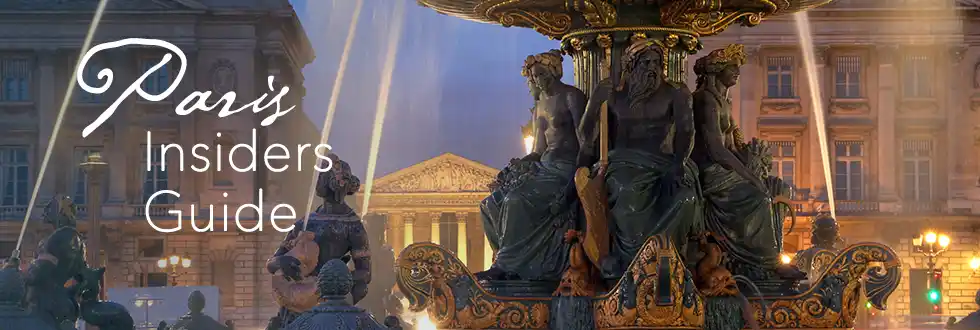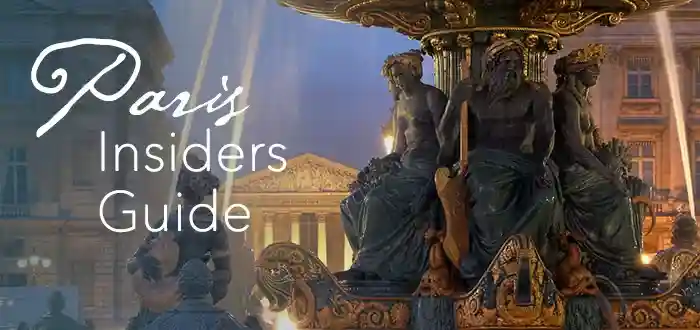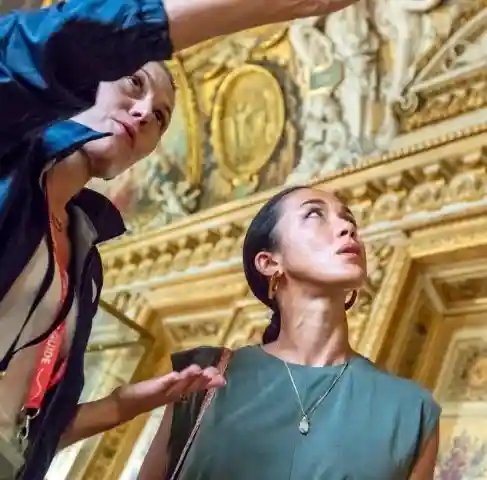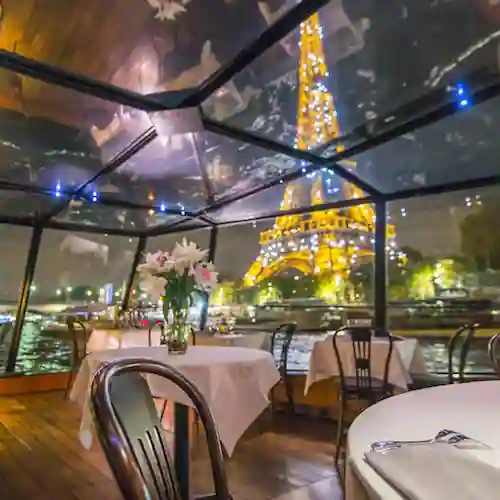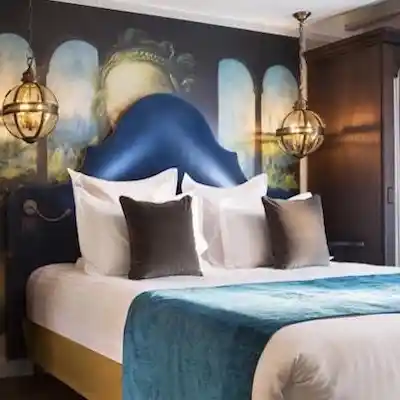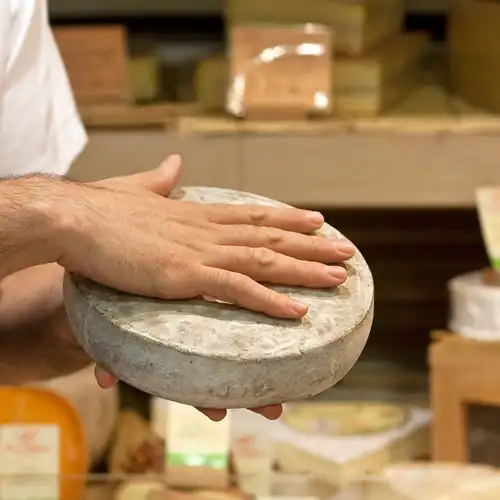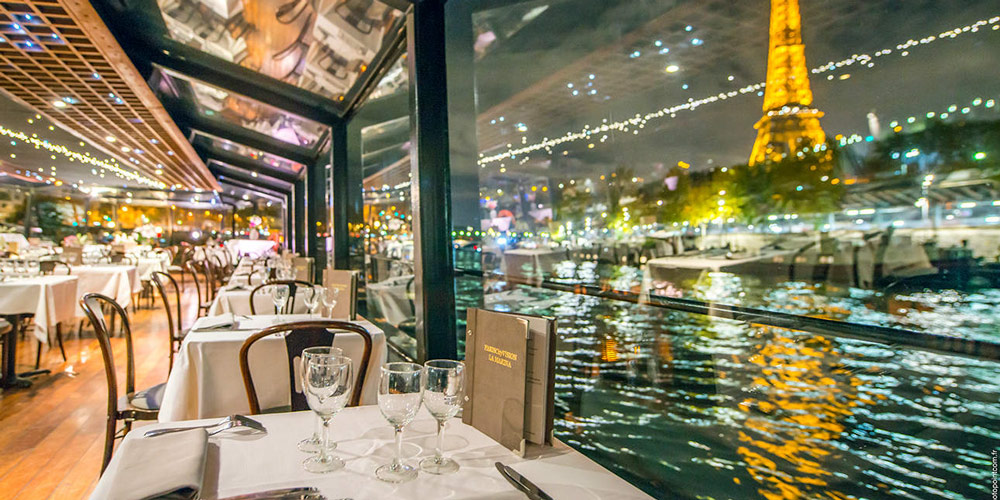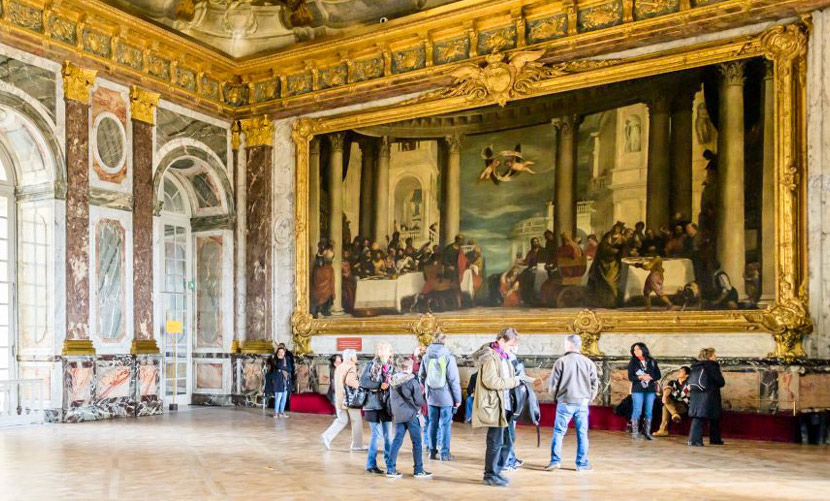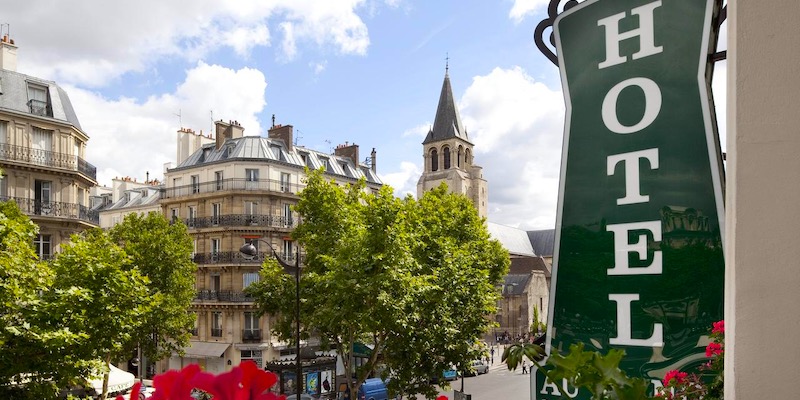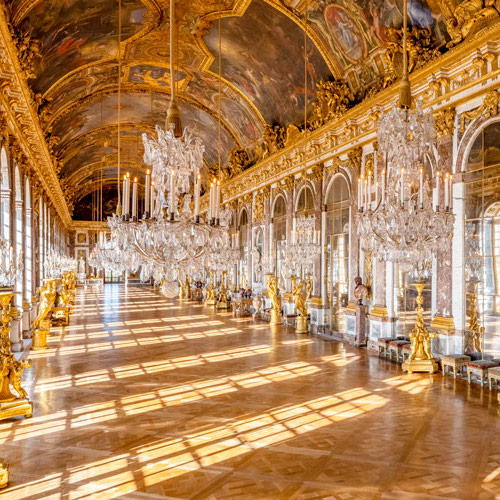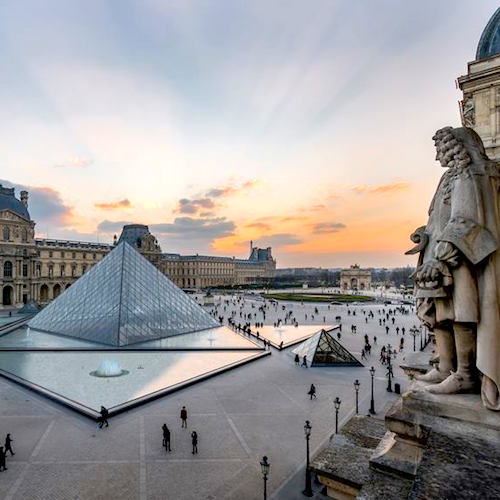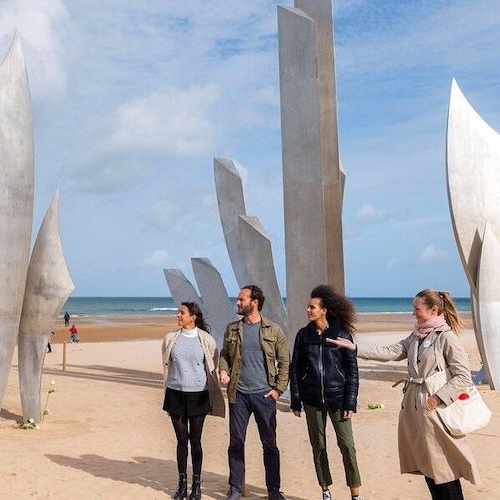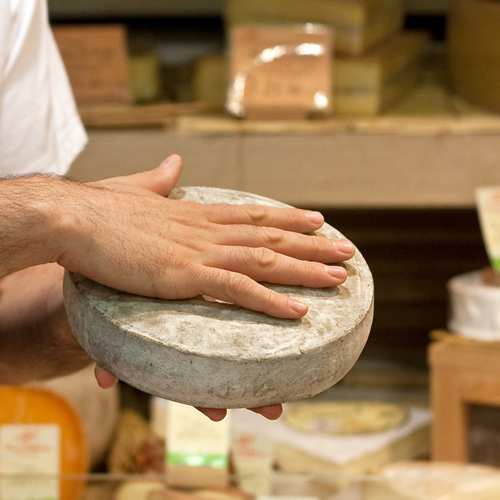The 7th Arrondissement Of Paris – Musée d'Orsay To The Eiffel Tower
Dominated by the Iron Lady — that is, the Eiffel Tower — and the golden dome of the Invalides, the 7th Arrondissement of Paris oozes privilege and charm. Nestled amongst high-profile monuments are intimate streets lined with boulangeries, delis, and fromageries that cater to Parisians who live in this quartier. Nothing beats this neighborhood for human-scale, for walkability, for markets, and for great restaurants. Although the 7th holds some of the grand symbols of Paris, look beyond them to discover the secrets of this most loved and admired neighborhood.
![]()
Our Top-Rated Experiences in the 7th Arrondissement
1. Eiffel Tower Skip-theLine Tour… Avoid the queues & go up the tower
2. Impressionist Tour of Musée d'Orsay … Skip the lines and see the Monets
3. Food Tour of the 7th Arrondissement… Explore the culinary side of the iconic district
4. Combined Ticket for Napoleon's Tomb + Musée de l'Armée… Description.
15 Great Things About the 7th Arrondissement
1. The Eiffel Tower
 Skip the long lines at the Eiffel Tower
Skip the long lines at the Eiffel Tower
It is by far the most recognized and loved symbol of Paris. The enduring Eiffel Tower was built to commemorate the centennial of the French Revolution and to be the centerpiece of the 1889 International Expo. Today the Eiffel Tower is the most-visited monument in the world — and that translates into long lineups.
One of our top pieces of Paris travel advice is to avoid the crowds by signing up for a skip-the-line Eiffel Tower tour. That's the only way you can get to the top tout de suite.
![]()
Discover What's On When You're Here...
• January... |
• February... |
• March... |
• April... |
• May... |
• June... |
• July... |
• August... |
• September... |
• October... |
• November... |
• December... |
Discover What's On When You're Here
• January...
|
• February... |
• March... |
|---|---|---|
• April... |
• May... |
• June... |
• July... |
• August... |
• September... |
• October... |
• November... |
• December... |
2. Musée d'Orsay
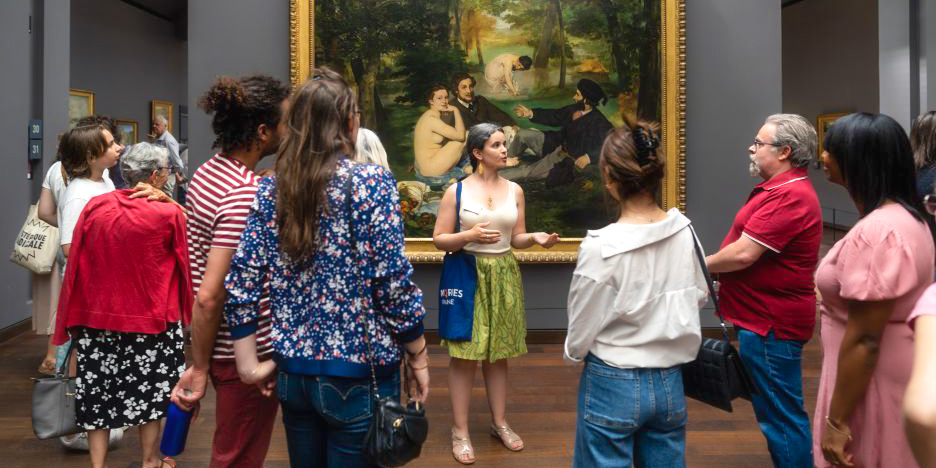 The main gallery at Musée d'Orsay
The main gallery at Musée d'Orsay
Musée d'Orsay vies with the Louvre for the title of top museum in Paris, and it's our personal favorite. Once a magnificent turn-of-the-twentieth-century train station, it was transformed in 1986 into a showcase for 19th-century art and culture. The d'Orsay's collection starts where the Louvre ends (at Romanticism) and goes up to the birth of modern art, for which you need to visit the Pompidou. This the place to get your fill of the Impressionists including Manet, Monet, van Gogh, Degas, Pissarro, Renoir, Berthe Morisot… the list boggles the mind.
The best way to view and appreciate all this amazing art (and to avoid the lineups while you do it) is to sign yourself up for a skip-the-line tour of the Orsay Museum, led by an art-expert guide. You learn a lot and see so much more.
![]()
|
Paris Dinner Cruises on the Seine Dine in style as you glide past the Eiffel Tower, Notre-Dame, and the Louvre on a magical Seine River cruise. Gourmet food, champagne, and Paris lit up at night – it’s unforgettable. |
|
Paris Dinner Cruises on the Seine Dine in style as you glide past the Eiffel Tower, Notre-Dame, and the Louvre on a magical Seine River cruise. Gourmet food, champagne, and Paris lit up at night – it’s unforgettable. |
3. Le Cinq Codet
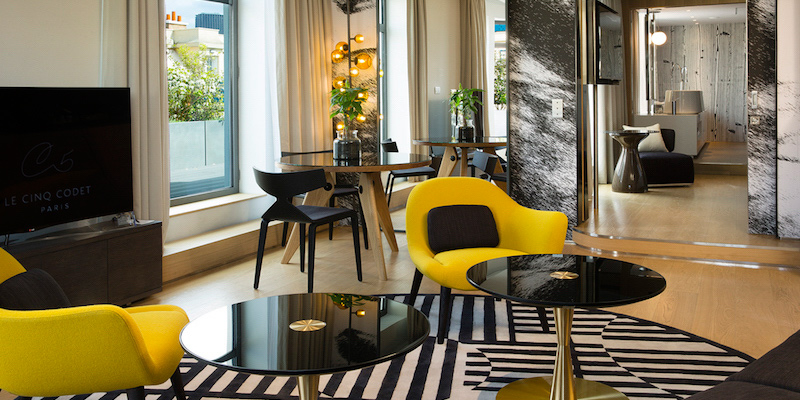 Art Deco styling at Le Cinq Codet
Art Deco styling at Le Cinq Codet
Our first hotel of choice in the 7th Arrondissement is this luxury hotel with a modern twist. The most-definitely Art Deco building started life as a France Telecom building but, in 2014, was completed restored and renovated into a chic hotel. Look down the street from one of the balconies and it feels as if you could reach out and touch the dome of Les Invalides. What's also refreshing about Le Cinq Codet is that it's not owned by a hotel chain, but by local couple who had a vision — and we love that vision.
4. Rue Saint-Dominique
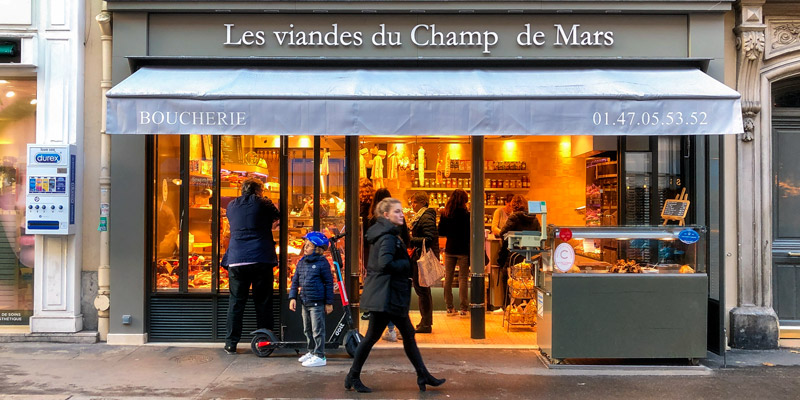 Food shopping on Rue Saint-Dominique. Photo by Mark Craft.
Food shopping on Rue Saint-Dominique. Photo by Mark Craft.
Rue St-Dominique is the spine of the 7th Arrondissement, arcing through the quartier and connecting three of its iconic monuments — from Musée d'Orsay in east, passing by Hotel des Invalides, and ending up at Champ de Mars and the Eiffel Tower in the west. Along its curved length you find the places where local residents shop and eat.
As you stroll along Rue St-Dominique you come to delectable boulangeries and patisseries, clothing boutiques, fruit & vegetable vendors, and all the other things that Parisian need on a daily basis. (Like hair salons and architects!) You also walk past a string of good restaurants and bistros.
![]()
Our Top-Rated Paris Experiences
5. Hotel de Varenne
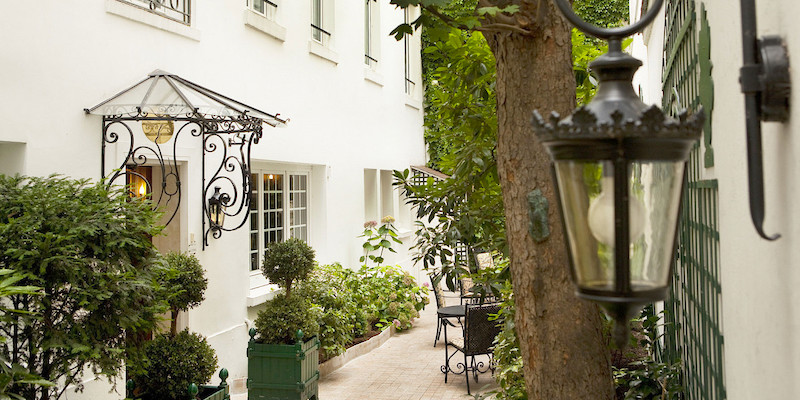 The courtyard at Hotel de Varenne
The courtyard at Hotel de Varenne
Close to Rue St-Dominque, the Eiffel Tower, and the amazing food street, Rue Cler. Hotel de Varenne is set in a quiet courtyard. As a visitor wrote, "Lovely little hotel in a great location."
6. Les Invalides & Napoleon's Tomb
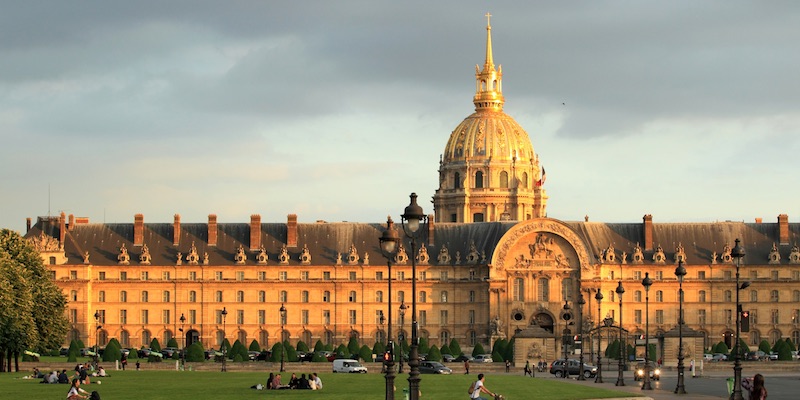 Les Invalides, with the dome atop the Tomb of Napoleon
Les Invalides, with the dome atop the Tomb of Napoleon
This monumental 17th-century complex was commissioned by Louis XIV to offer accommodation and hospital care to the veterans of France's wars. After Napoleon's abdication in 1815, 5,000 veterans of his Grande Armée sought refuge here. Later, in 1840, Napoleon himself moved into the Invalides when his body was relocated to the domed church, called, appropriately, Église du Dome. Today, the building houses military-themed exhibitions, including the Musée de l'Armée.
![]()
|
Escape to the Land of Bubbly on a small-group day tour from Paris. Taste at top Champagne houses, meet boutique producers, enjoy a leisurely lunch, and toast to a perfectly sparkling day. |
|
Escape to the Land of Bubbly on a small-group day tour from Paris. Taste at top Champagne houses, meet boutique producers, enjoy a leisurely lunch, and toast to a perfectly sparkling day. |
7. Musée de l'Armée
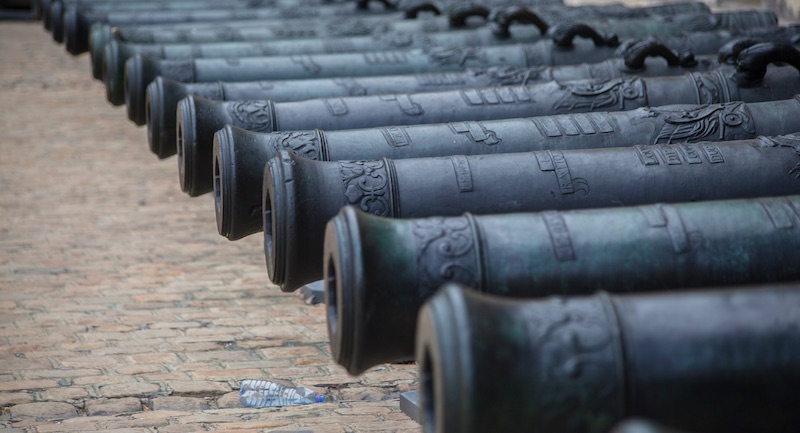 Canons in a row at the Musée de l'Armée
Canons in a row at the Musée de l'Armée
This museum, part of the complex of Les Invalides, holds one of the largest collections of military objets in the world. Swords, guns, and armor are mixed with models and maps that trace the evolution of warfare from prehistoric times to World War II. Especially prominent are souvenirs from Napoleon's era, but you'll also find displays from medieval, Renaissance and Asian militia.
8. Champ de Mars
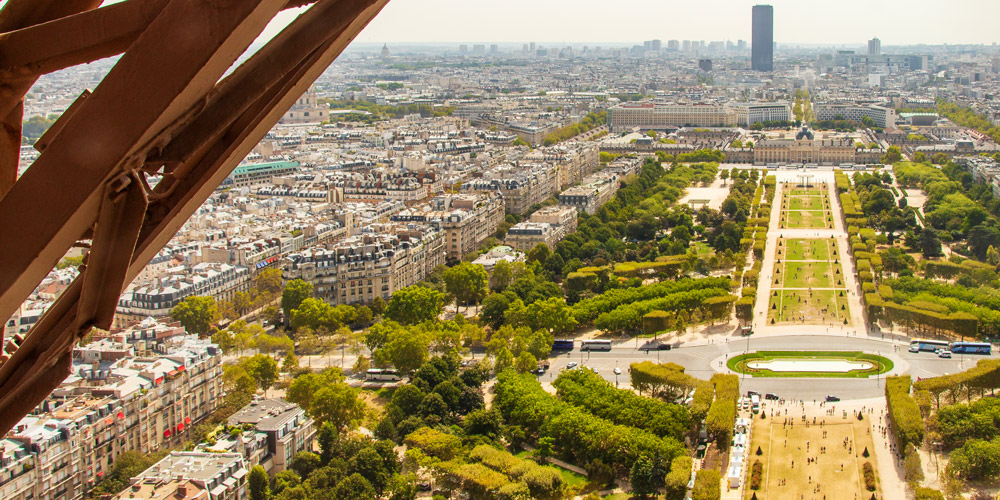 View of Champ de Mars from the Eiffel Tower. Photo by Mark Craft.
View of Champ de Mars from the Eiffel Tower. Photo by Mark Craft.
A great place for a stroll in the 7th Arrondissement is along the Champ de Mars (literally translated as the Field of Mars) and the small streets that radiate from it. Notice the to-die-for elegant apartments that look upon the park and the Eiffel Tower. Stretching from the École Militaire to the Tower itself, you can almost imagine the battles that took place on this field when Roman Legions defeated the Parisii in 52 BCE, or in 886 CE when the Parisians beat back the invading Vikings. Jump forward to 1790 when Charles Talleyrand, a popular French bishop, organized one of the first Bastille celebrations here.
Champs de Mars once was a military parade ground used by the military school that abuts it. But, in the modern era it's been a place of celebration, public gatherings, and of the international expositions in 1867, 1878, 1889, 1900, and 1937.
9. Palais Bourbon – Assemblée Nationale
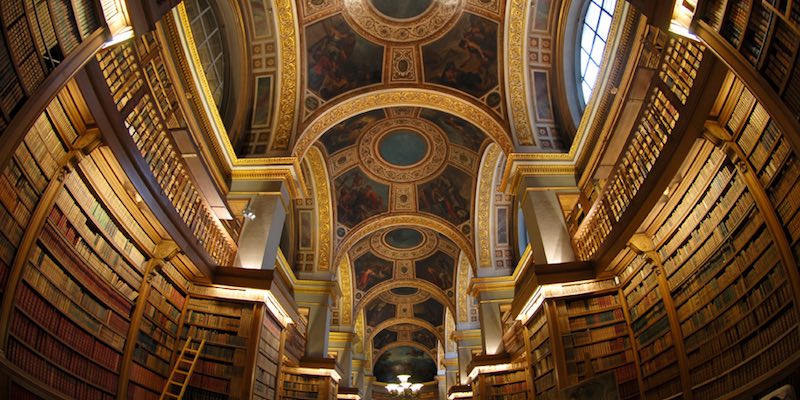 Domed ceiling of the Palais Bourbon
Domed ceiling of the Palais Bourbon
Home of the lower house of the French parliament, this palais was built in 1728 for the Duchess of Bourbon, Louise Françoise de Bourbon, the eldest daughter of Louis XIV. Later a Greek Revival facade was built on the side facing the Seine to mirror the opulence of Église de La Madeleine across the river. It is now where the Assemblée Nationale meets.
Tours of the building are arranged in advance through the elected deputés. If you do get inside, don't miss Delacroix's masterly History of Civilization painted on the ceiling of the library. The square, Place du Palais-Bourbon built in 1776, is dominated by the main entrance providing a view of the inner courtyard.
- 33 Quai d'Orsay
- Visiting the Assemblée Nationale…
![]()
Our Top-Rated Paris Experiences
10. Musée Rodin
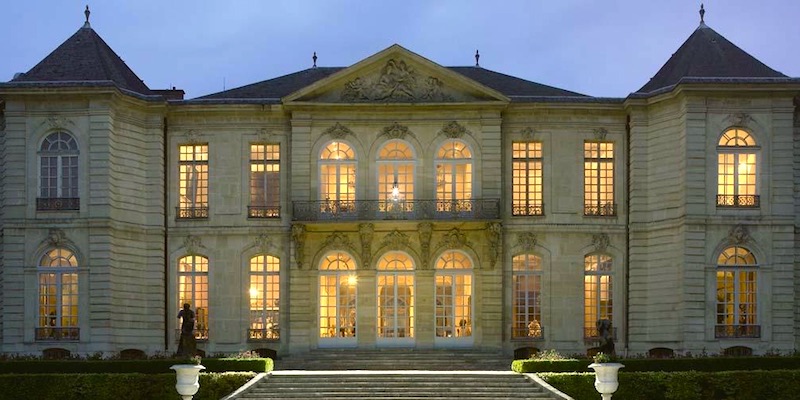 Hôtel de Biron, home of the Musée Rodin
Hôtel de Biron, home of the Musée Rodin
Just east of the Les Invalides, near the Assemblée Nationale's Place du Palais-Bourbon, you'll also find a scattering of elegant 17th- and 18th-century hôtel particulars, including the recently renovated Hôtel de Biron, where Auguste Rodin lived and worked until his death in 1917, and which today houses the Musée Rodin. It's worthwhile to take some time to wander through Rodin's studio and gardens and to ponder his relationship with sculptress Camille Claudel. It's a small museum, so after an hour or so stop for a glass of rosé wine at the charming outdoor cafe.
11. Fontaine de Mars
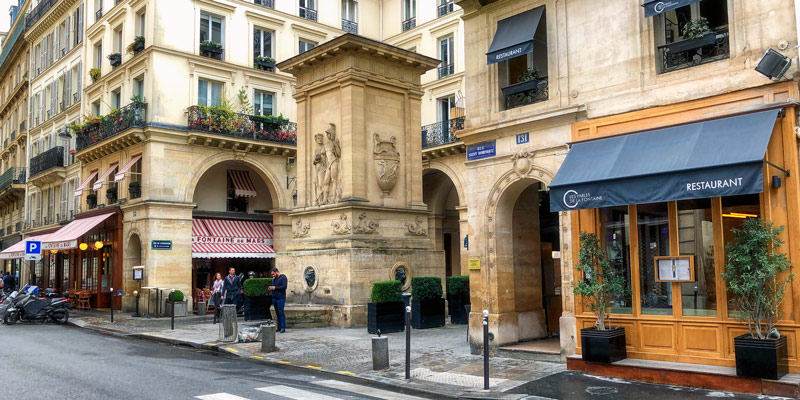 Fontaine de Mars on Rue St-Dominique. Photo by Mark Craft.
Fontaine de Mars on Rue St-Dominique. Photo by Mark Craft.
This freestanding fountain, built by Henri Beauvarlet, was once situated in the middle of a bucolic grove of poplar trees. In 1859, when the square it now sits in was built, the poplars went, but the fountain stayed. Notice the bas-relief of Hygeia, goddess of health, offering a drink to Mars, god of war. While you're there, have lunch or dinner at the bistro bearing the same name. La Fontaine de Mars has been a popular bistro since 1908. This is where the Obamas had a family meal when they visited Paris in 2009. On an occasion nearly as famous, it's where we had a Christmas seasonal dinner in 2006!
12. Le Violon d'Ingres – Au Revoir, Chef Constant
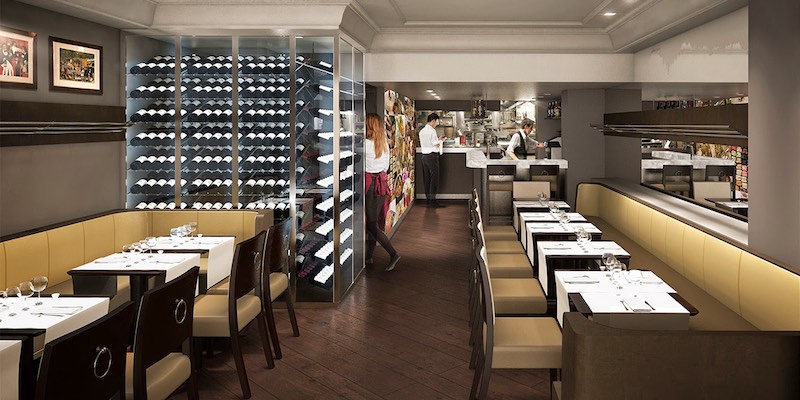 The long, narrow dining room of Le Violon d'Ingres
The long, narrow dining room of Le Violon d'Ingres
Chef Christian Constant is a legend of the Paris restaurant scene. Years ago, when he was head of the kitchen at hotel Le Crillon he mentored many young chefs who later would open their own equally-famous places. For a couple of decades, Chef Constant "owned" the restaurant scene along Rue St-Dominique in the 7th Arrondissement, in the section of the street nicely defined by the Fontaine de Mars and the Champ de Mars — Cafe Constant, Les Cocottes, Fables de La Fontaine.
The jewel in Constant's mini-empire was Le Violon d'Ingres, his Michelin-starred upscale restaurant. It's a long narrow space with the kitchen way at the back. We've gone here for lunch, dinner, and even New Years Eve and it's always been a delight.
Unfortunately for us, but good for him, Chef Constant has retired and has passed his restaurant spaces into the hands of other talented chefs. In the case of Le Violon d'Ingres there's a team of chefs producing dishes good enough to retain the restaurant's long-held Michelin star. Au revoir, Chef Constant. Tu nous manques.
- 135 Rue St-Dominique
- Website…
![]()
The Best Evenings in Paris
|
Dinner & Cabaret at the Moulin Rouge |
VIP Dinner Cruise with Bateaux Parisiens |
|
Dinner & Cabaret at the Moulin Rouge |
13. Rue Cler – The Market Street
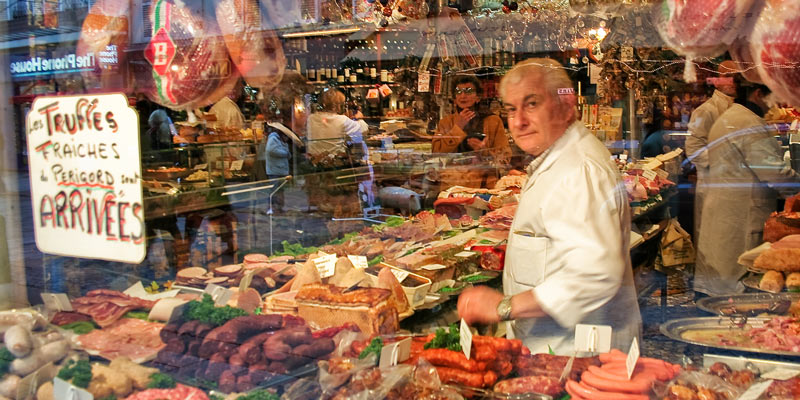 Davoli, La Maison du Jambon. Photo by Mark Craft.
Davoli, La Maison du Jambon. Photo by Mark Craft.
On Rue Cler you can see the best-dressed shoppers in Paris perusing the bounty of the butchers, bakers, poissonniers, fromagers, and wine merchants that line this cobblestone street. Davoli, La Maison du Jambon, is a feast for your eyes with Parma hams hanging from the ceiling and jolly, rosy-cheeked butchers serving up a selection of mouthwatering sausages and meats.
Also on Rue Cler is the very popular Café du Marché, one of the greatest bargain restaurants in Paris and a personal favorite of ours for lunch. Arrive early if you want to grab a seat and then order a confit de canard, le hamburger, or classic roast chicken with the creamiest mashed potatoes you've ever had the pleasure of eating.
14. Les Egouts – Museum of Paris Sewers
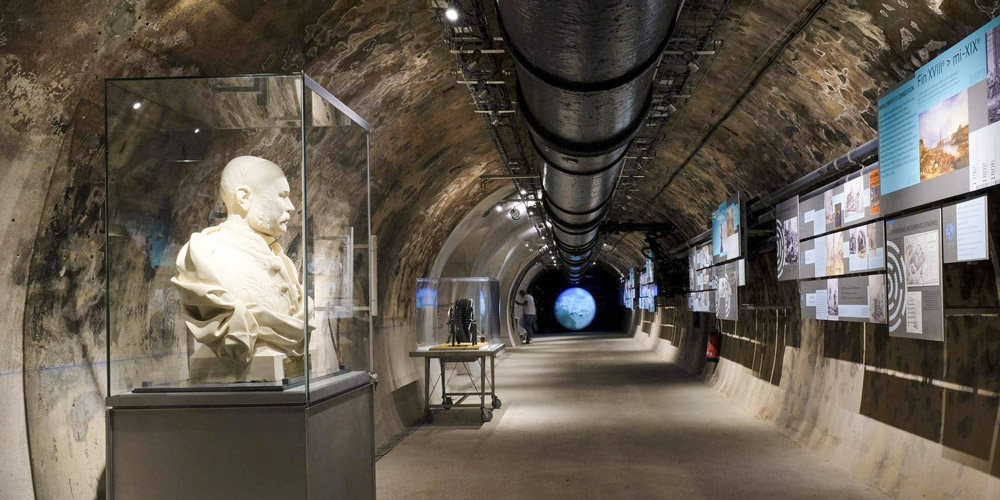 The sewers of Paris museum
The sewers of Paris museum
Where else but Paris would the sewers be a popular underground attraction? The 1,300 mile network of tunnels was built during the reign of Napoleon III and is one of city planner Baron Haussmann's top achievements. The underground labyrinth that Haussmann built houses outgoing sewage lines and freshwater pipes, and also contain the city's gas lines as well as a pneumatic postal network, a service which only ceased in 1984. You used to be able to take underground boat cruises through the sewers, but a string of bank robberies, using the sewers as an escape route, put a stop to the cruises. Today there are guided walking tours of parts of the sewers.
- Pont de l'Alma
- 93 Quai d'Orsay, 75007
- Website…
![]()
|
From Paris to Provence, Burgundy to Bordeaux, find hotel deals with current sale prices. Save up to 20% in cities, villages, beach towns, and storybook countryside escapes. |
|
Discover today's sale prices on hotel rooms in every village & city in France. Save up to 20%. Find hotels in Paris, Burgundy, Provence, the Loire Valley, Normandy, and everywhere else! |
15. Musée du Quai Branly
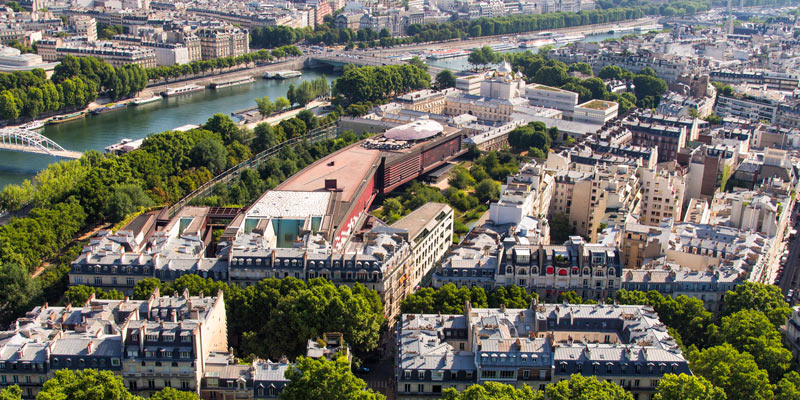 Musée du Quai Branly as seen from the Eiffel Tower, photo by Mark Craft
Musée du Quai Branly as seen from the Eiffel Tower, photo by Mark Craft
This relative newcomer to the Paris museum scene has been open since 2006. Here you find outstanding collections of African, Asian, Oceania and native American arts and civilizations. There are always special exhibitions — on things like folk art, on the presentation of human forms in native art, and recently on primitive influences in the work of Picasso. Quai Branly also has a tranquil patio where you can take a break and enjoy a drink or a light lunch.
7th Arrondissement Resources
- La Fontaine de Mars. 131 Rue St-Dominique.
• Website… - Le Bon Marche & La Grande Epicerie. These two wonderful shops — the top department store in Paris and our favorite food store — are technically in the 7th Arrondissement. But we always think of them as part of the life of the Saint-German quartier.
• Guide to Saint-Germain-de-Prés Paris… - Metro Lines. Serving the center of the arrondissement (think Invalides) is Line 13 running north and south. The older part of the quartier, between the Eiffel Tower and Invalides, was left largely untouched during the massive renovations of Paris in the 19th century. One result is that this area, which wasn't dug up for new boulevards, is something of a black hole for Metro stations. Line 8 runs along its eastern edge, and RER C runs along the river, but for most of the neighborhood it's buses and walking.
• Paris Metro Guide…
Paris Planning Guides
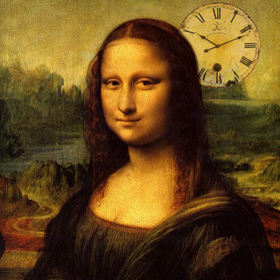 Skip-the-line Louvre Tour
Skip-the-line Louvre Tour |
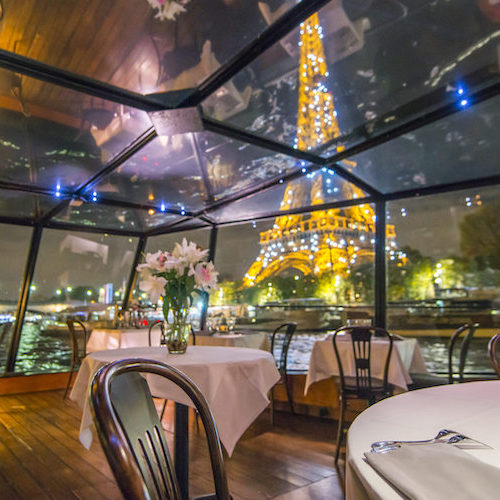 Glorious Dinner Cruises
Glorious Dinner Cruises |
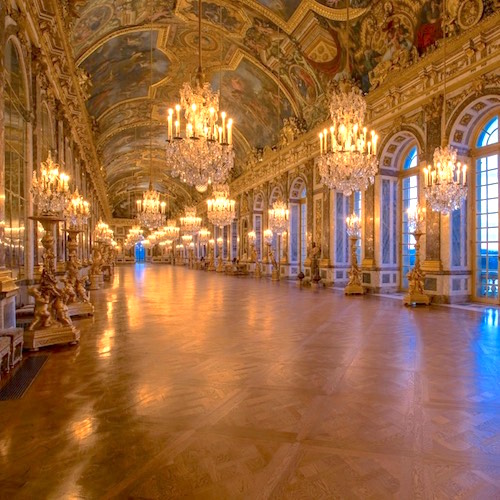 Visiting Versailles
Visiting Versailles |
 VIP to Champagne
VIP to Champagne |
